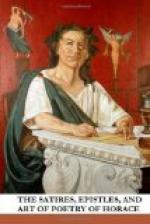More nags would want their corn, more grooms their meat,
And waggons must be bought, to save their feet.
Now on my bobtailed mule I jog at ease,
As far as e’en Tarentum, if I please,
A wallet for my things behind me tied,
Which galls his crupper, as I gall his side,
And no one rates my meanness, as they rate
Yours, noble Tillius, when you ride in state
On the Tiburtine road, five slaves en suite,
Wineholder and et-ceteras all complete.
’Tis thus my life is happier, man of pride,
Than yours and that of half the world beside.
When the whim leads, I saunter forth alone,
Ask how are herbs, and what is flour a stone,
Lounge through the Circus with its crowd of liars,
Or in the Forum, when the sun retires,
Talk to a soothsayer, then go home to seek
My frugal meal of fritter, vetch, and leek:
Three youngsters serve the food: a slab of white
Contains two cups, one ladle, clean and bright:
Next, a cheap basin ranges on the shelf,
With jug and saucer of Campanian delf:
Then off to bed, where I can close my eyes
Not thinking how with morning I must rise
And face grim Marsyas, who is known to swear
Young Novius’ looks are what he cannot bear.
I lie a-bed till ten: then stroll a bit,
Or read or write, if in a silent fit,
And rub myself with oil, not taken whence
Natta takes his, at some poor lamp’s expense.
So to the field and ball; but when the sun
Bids me go bathe, the field and ball I shun:
Then eat a temperate luncheon, just to stay
A sinking stomach till the close of day,
Kill time in-doors, and so forth. Here you see
A careless life, from stir and striving free,
Happier (O be that flattering unction mine!)
Than if three quaestors figured in my line.
SATIRE VII.
PROSCRIPTI Regis RUPILI.
How mongrel Persius managed to outsting
That pungent proscript, foul Rupilius King,
Is known, I take it, to each wight that drops
Oil on bleared eyes, or lolls in barbers’ shops.
Persius was rich, a man of great affairs,
Steeped to the lips in monetary cares
Down at Clazomenae: and some dispute
’Twixt him and King had festered to a suit.
Tough, pushing, loud was he, with power of hate
To beat e’en King’s; so pestilent his
prate,
That Barrus and Sisenna you would find
Left in the running leagues and leagues behind.
Well, to return to King: they quickly see
They can’t agree except to disagree:
For ’tis a rule, that wrath is short or long
Just as the combatants are weak or strong:
’Twixt Hector and Aeacides the strife
Was truceless, mortal, could but end with life,
For this plain reason, that in either wight
The tide of valour glowed at its full height;
Whereas, if two poor cravens chance to jar,
Or if an ill-matched couple meet in war,
Like Diomede and Glaucus, straight the worse
Gives in, and presents are exchanged of course.




